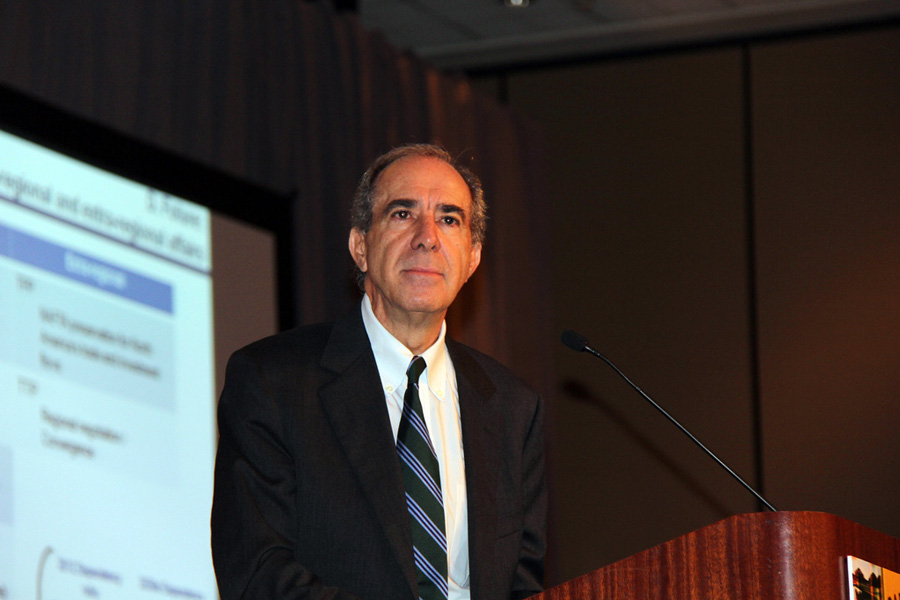If you’re wondering where the opportunities are in the global food economy, you need to follow the fast food joints, says an agricultural economist.
A new McDonald’s pops up in a typical day in China, as does a Kentucky Fried Chicken. These quick service restaurants need a steady supply of safe, uniform food, such as meat and French fries, Sterling Liddell told Canola Council of Canada convention delegates in San Antonio last week.
“And that’s what’s driving a lot of this demand that’s happening in China for additional and higher-quality products, is that they need not just to consume more. They need to reform their agricultural system or their consumption system as they go forward,” Liddell said. Liddell is the vice president of Rabobank Food and Agribusiness Research and Advisory.
Read Also

Note to subscribers: Planting a new seed for Grainews
Grainews now moves into The Western Producer as part of the farm newspaper’s new Farm Work section, providing Western Canada’s grain growers with one place to get the news and information they need.
Liddell labelled the 21st Century the Asian Pacific Century, and said he expects to see a 50 per cent jump in consumption of agricultural products in the region.
“At the same time we only expect to see about 25 per cent increase in the production of agricultural products. So this creates a big draw on global resources from agricultural production,” added Liddell.
But China isn’t the only player in the Asia Pacific region, Liddell said. People in other countries are eating more protein as their incomes rise, too. Indonesia, at 250 million people, holds the fourth largest population in the world, Liddell said. Its citizens don’t consume a lot of protein yet, but protein consumption has doubled in the last 10 years, mostly in poultry, Liddell added.
Dr. Vincent Amanor-Boadu, professor of agribusiness at Kansas State University, said the food and agriculture industry shouldn’t underestimate what India brings to the table. “They are integrated into the global market already. And it’s a democracy.”

Middle class demands better quality food
Both Liddell and Amanor-Boadu said that members of the newly-minted middle class want better quality food, and that has direct implications for products such as canola oil. Companies supplying a mass market tend to use palm oil. Those supplying consumers seeking convenient food switch to soybean oil, while those supplying high-quality products use canola oil.
“You can see the demand for these products, for canola oil in particular, just has a good future as we look at this curve,” said Liddell.
And it’s not just the ballooning global population that is shifting the middle class’ diet. The earth’s population is aging too, which means people will generally be eating less. Food quality becomes more important to this demographic, Amanor-Boadu said.
“Food is going to be consumed more and more as medicine because we are going to be conscious, looking at what is in it,” said Amanor-Boadu.
From the Manitoba Co-operator website: A less glamorous-but more effective-approach to feeding the world
Looking to the next 10 years Liddell expects to see particularly strong growth in protein meal and oil. China will fuel demand for raw oilseed because of the soybean crush capacity.
“But the other countries who don’t necessarily have that will be looking to purchase meal and oil, so that will be a rapid growth. We actually expect that to outpace coarse grains and wheat for production,” said Liddell.
Meal drives the value of soybean crush, and Liddell sees opportunity there for canola as well. Canola oil is known globally as a healthy product. “It’s enhancing the usage of canola meal in other rations throughout North America and other places especially as the demand for meal proteins increases.”
The canola industry has an advantage as the entire supply chain works together strategically, Amanor-Boadu said. He urged delegates to think about market segmentation, something the auto and technology industries are already doing in emerging economies.
The Canadian canola industry also needs to build on canola’s reputation as a healthy product, said Amanor-Boadu.
“Food origin is critical. And I’ve got to say this to Canadian food industry, we do have a reputation around the world as pristine, and safe, and healthy,” said Amanor-Boadu.
“And that maple leaf? People love it.”
















